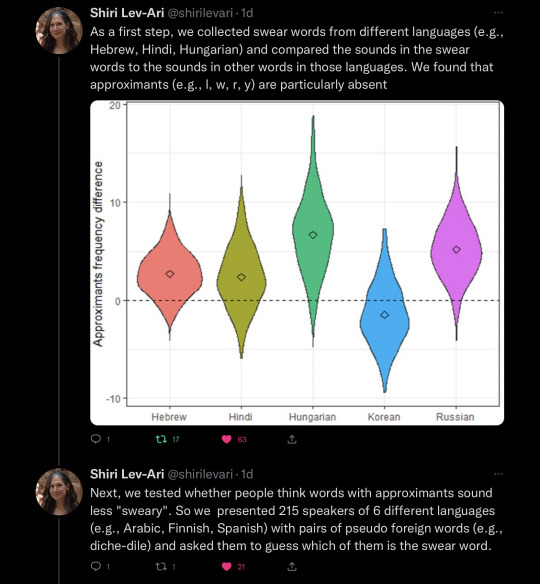Note
Why did you include neopronouns in your linguistic course? If you did, I hope you specified that neopronouns are neologisms (at least in English) and that pronouns are a pretty closed class category of words in English.
i really hope you didn't intend this to seem as condescending as it turned out <3
653 notes
·
View notes
Link
4 notes
·
View notes
Text
so the thing about english is that people think it's so divorced from other germanic languages based on like. words. I've even heard people try to insist that english is a romance language. because of that whole messy business in 1066 with out-of-wedlock willy and his band of naughty normans. and now a good chunk of the vocabulary is french or whatever and they're prestigious so not using them makes you sound like a rube and this and that and the other
and yes william the conqueror will never be safe from me. I will have my revenge on him. he fucked up a perfectly good germanic language is what he did. this will be me in hell

but the thing is that most words in, say, german do have a one to one english equivalent. not all hope is lost, for those who still dare to see it. it's just that you 1066pilled normancels aren't looking in the right place
dog (en) ≠ der Hund (de) but der Hund (de) -> hound (en)
look with your special eyes. that one was easier. not all of them are this intuitive because of semantic narrowing and broadening and waltzing and hokey-pokeying and whatever else. I'll give you a few more
animal (en) ≠ das Tier (de)
aha! you think. I've got him on the ropes now.
but then
das Tier (de) -> deer (en)
nooooo!! you whine and cry in gay baby jail. the consonants are different!!! listen to me. listen, I say, putting both my hands on your shoulder. /t/and /d/ are the same sound. you just put your voice behind one of them.
nooooooooo!! you wail. deer are animals but not all animals are deer!!! listen to me. LISTEN. they used to be. animals used to be deer. that's just what we called them. it was a long time ago. it was a weird time in all our lives. it's okay.
let's try for a verb this time
to die (en) ≠ sterben (de) but sterben (de) -> to starve
same principle with the consonants, we're just changing a stop (where we completely stop the airflow and then let it through) for a fricative (where we still let some air go through. idk where it's going. maybe to its job or something.)
to starve used to mean generally to die, not just to die of malnourishment. we do that a lot. we take one word for a lot of things and make it mean one thing. or take one word for one thing and make it mean a lot of things. this is common and normal.
"okay but roland," you say, suddenly coming up with an argument. "what about tree? trees are super common. I don't think we'd fuck around too much with that. the german word is baum! what about THAT?"
"when did you learn german?" I ask, but then decide it isn't relevant right at this very moment. but fine.
tree (en) ≠ der Baum (de) but der Baum (de) -> beam (en)
beam??? you ask incredulously. beam???? BEAM?????? you continue with the same tone and cadence of captain holt from brooklyn 99.
yes. beam. like the evil beams from my eye I'm going to hit you with if you don't stop shouting.
but the vowels!!! you howl.
listen. listen to me. the vowels mean nothing. absolutely nothing. they're fluid like water. it got raised in english.
"WHAT DOES RAISED MEAN"
it doesn't matter right now. they were raised better than you, at least. stop shouting. open your eyes and see what god has given you. they're the same word.
"they're NOT the same word. they mean different things!"
we've been over this. they didn't used to. a beam was (and is) a long solid piece of wood. much like the long solid piece of wood I showed your mother last night.
FAQ:
Q: could english be some kind of germanic-romance hybrid?
A: do you become a sexy thing from the black lagoon just because you dressed up as one for halloween? english may have gotten a lot of vocabulary from norman french, but its history and syntax are distinctly germanic. that's what we base these things on.
Q: okay but what does it matter? this doesn't actually affect my day to day life
A: you come into my house? you come into my house, the house of an autistic man living in vienna austria and studying english linguistics and you ask me what does it matter? sit back down. I was going to let you go but now I have powerpoints to show you
Q: you're stupid and wrong and gay and a bad person
A: I know it's you, Willy

389 notes
·
View notes
Text
Just checking....
We all pronounce Miette like My-TAY in our heads, right?
#I am enthralled#I love all the interpretations bc they never would of occured to me#I know how it's pronounced but the other options are so much more interesting
39K notes
·
View notes
Text
My new hobby is to frame actual language inventories as conlang inventories and watch people say they're unrealistic or unnaturalistic
505 notes
·
View notes
Text
7K notes
·
View notes
Text
LINGUIST List‘s „Fun Fact“
„Solresol, devised by Jean-François Sudre in the 19th century, stands out among constructed languages for its unique reliance on musical tones rather than conventional phonetics or written symbols. Initially dubbed "la Langue musicale universelle," translating to the international music language, Solresol sought to be a universal mode of communication transcending linguistic barriers. […]“
For pronunciation tips and more information on how Solresol works as a language, visit this website: https://llllllll.co/t/solresol-constructed-musical-language-1866/64014
Read more here:
7 notes
·
View notes
Text
That viral video from last month of a giraffe pushing a tortoise was interesting to me because I saw it in French & Spanish corners of the internet and everyone was referring to the animals in the video as 'she' since giraffe & tortoise are feminine words, meanwhile on the English-speaking internet I saw a minority of people referring to them as 'it' or 'they', an overwhelming majority using masculine words, and almost no one use 'she'








Similarly romance language speakers humanised these animals using women's names while English speakers used men's names:


And of course it would have been different had the giraffe been an elephant (masculine word) but yeah I find it interesting that when it comes to personifying animals and things, speakers of gendered languages will go 50% masculine 50% feminine due to grammatical gender, while speakers of a non-gendered language with a neutral pronoun will go like 80% masculine 18% neutral 2% feminine.
It must feel weird to learn a gendered language and have to accept that a door is 'she', but it also feels weird to learn a non-gendered language like English and then scroll down hundreds of comments under an animal video and all the animals are 'he'. I'm reminded of a cartoon I saw on tumblr once with a speaking lightbulb, and all the comments referred to it as 'he' and a 'guy' (in french & spanish, people would call it she.) I wonder how it affects the way you frame the world in your mind? you ask a French kid to personify a spoon or a mouse or a raindrop, it's going to be a female character by default. I feel like that's something English speakers rarely consider—that compared to languages that are 'visibly', officially gendered in a 50/50 way, English is less neutral, and more masculine-gendered. When anglophones learn about grammatical gender they tend to react like "why is a chair a 'she' that's absurd?", but when the context calls for it they'll call a lightbulb 'he' without thinking about it
1K notes
·
View notes
Text
Cranky because your language doesn't have diminutives aren't you
8K notes
·
View notes
Text




id: screenshots from twitter thread by @shirilevari on common phonemes in swear words, linked here. the linked paper at the bottom is here. /end id
15K notes
·
View notes
Video
Putain de + noun
411 notes
·
View notes
Text
In finnish, the word for "opinion" is mielipide, from the word mieli - mind, and pide, which is a somewhat archaic form of pidike - a holder, support, clip, clamp. The word pide/pidike itself comes from the verb "pitää", to hold, or keep. So while nobody thinks of it in such poetic terms in everyday life, the finnish word for "opinion" essentially translates to being some sort of a mental carabiner or foothold in your mental scape that you can hold onto, grab for support, or attach things to keep them fastened.
And in finnish vernacular, especially online, it's often shortened to just MP, MieliPide - and you can ask peoples' opinions about things by just stating "Opinion: subject" to start a conversation. It's very succinct. For example, you can make a three-word statement:
MP: homoilu saunassa?
To ask the same question which in english is a far more long and takes more words: "What is your opinion on doing gay activities in the sauna?"
2K notes
·
View notes
Text
5 notes
·
View notes
Text
i'm conducting an experiment. everyone who's from an english speaking country state your country, regional area and what you call the following images. i need to see something









#NS Canada#Fries chips biscuits#Cookies pop candy#Cigarettes/darts if ur feeling it#Toque cotton candy
24K notes
·
View notes
Text
37K notes
·
View notes
